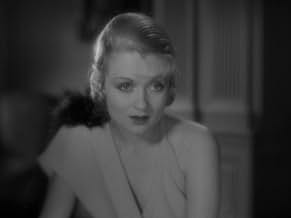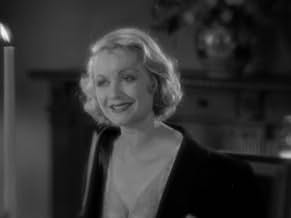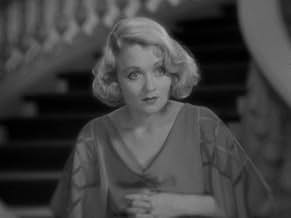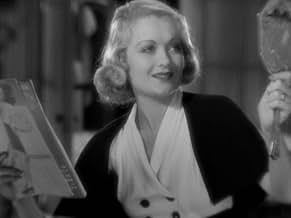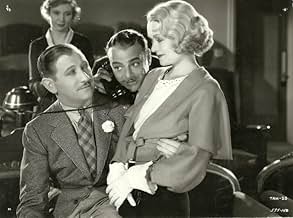IMDb RATING
7.0/10
2.7K
YOUR RATING
The career of a waitress takes off when she meets an amiable drunken Hollywood director.The career of a waitress takes off when she meets an amiable drunken Hollywood director.The career of a waitress takes off when she meets an amiable drunken Hollywood director.
- Nominated for 1 Oscar
- 1 nomination total
George Reed
- Undetermined Secondary Role
- (scenes deleted)
Alice Adair
- Undetermined Secondary Role
- (uncredited)
Eddie 'Rochester' Anderson
- James - Max's Butler
- (uncredited)
Sam Armstrong
- Undetermined Secondary Role
- (uncredited)
Zeena Baer
- Secretary to Julius Saxe
- (uncredited)
King Baggot
- Department Head
- (uncredited)
Gerald Barry
- John Reed - an Actor
- (uncredited)
Floyd Bell
- Undetermined Secondary Role
- (uncredited)
Veda Buckland
- Nana - Jackie's Nursemaid
- (uncredited)
Nicholas Caruso
- Chef at Brown Derby
- (uncredited)
Lita Chevret
- Actress Filming on Movie Set
- (uncredited)
Storyline
Did you know
- TriviaThis film bears such a striking resemblance to A Star Is Born (1937) that it is often considered "the original version" of that often remade classic. In fact, David O. Selznick, who produced both this film and Star is Born, was threatened with a lawsuit by this film's writers, claiming plagiarism.
- GoofsAs Lowell Sherman, playing Max Carey, enters the Brown Derby, the entry door at the actual exterior location changes from multi-paned to single-paned at the interior, soundstage set.
- Crazy creditsThere is a "by" credit to Gene Fowler and Rowland Brown after the title shows, but there is also a "screenplay by" credit to Jane Murfin and Ben Markson, without leaving any clear explanation or context as to what "by" actually means. But the reality was that Fowler and Brown wrote the real screenplay, with Murfin and Markson providing the continuity.
- ConnectionsFeatured in David O. Selznick: 'Your New Producer' (1935)
- SoundtracksThree Little Words
(1930) (uncredited)
Music by Harry Ruby
Part of a medley played during the opening credits
Featured review
Another film that deserves a wider viewership and a DVD release, "What Price Hollywood?" looks at the toll Hollywood takes on the people who make it possible.
Adela Rogers St John wrote the Oscar-nominated story of a fading genius of a director, destroyed by drink, who launches one last discovery into the world. Lowell Sherman, himself both a director and an alcoholic, played the sad role that had been modeled, in part, on his own life. (Sherman's brother-in-law, John Barrymore, was also a model, as was the silent film director Marshall Neilan.) The divinely beautiful Constance Bennett plays the ambitious Brown Derby waitress who grabs her chance. Neil Hamilton, paired to great effect with Bennett that same year in "Two Against the World," plays the east-coast polo-playing millionaire who captures Bennett's heart without ever understanding her world.
George Cukor directed the film for RKO, and already the seeds of his directorial genius can be seen. Wonderful montages and double exposures chart Bennett's rise and fall as "America's Pal," and I've rarely seen anything as moving as the way Cukor presented Sherman's death scene, using quick shot editing, exaggerated sound effects and a slow motion shot. As startling as it looks today, one can only imagine the reaction it must have caused over 70 years earlier, before audiences had become accustomed to such techniques.
While the romantic leads are solid--Bennett, as always, especially so--and Gregory Ratoff is mesmerizing as the producer, hats must be doffed to Lowell Sherman for his Oscar-calibre performance. The slide from charming drunk to dissolute bum is presented warts and all, and a late scene in which the director examines his drink-ravaged face in the mirror is powerful indeed. It's hard to imagine what it must have been like for Sherman to play such a role and it was, in fact, one of the last roles he took for the screen, before concentrating on directing--then dying two years later of pneumonia.
When David O. Selznick made "A Star is Born" for United Artists five years later, four years after leaving RKO, the RKO lawyers prepared a point-by-point comparison of the stories, recommending a plagiarism suit--which was never filed. The later movie never credited Adela Rogers St John or any of the source material of "What Price Hollywood?" for its own screenplay, which was written by Dorothy Parker from, supposedly, an idea of Selznick's.
"What Price Hollywood?" is a great source for behind-the-scenes tidbits--Cukor fills the screen with images of on-set action (or inaction), with various crew waiting about as they watch the film-in-a-film action being filmed. This movie works as history and as innovation, but it also works on the most important level, as a well-told story.
Adela Rogers St John wrote the Oscar-nominated story of a fading genius of a director, destroyed by drink, who launches one last discovery into the world. Lowell Sherman, himself both a director and an alcoholic, played the sad role that had been modeled, in part, on his own life. (Sherman's brother-in-law, John Barrymore, was also a model, as was the silent film director Marshall Neilan.) The divinely beautiful Constance Bennett plays the ambitious Brown Derby waitress who grabs her chance. Neil Hamilton, paired to great effect with Bennett that same year in "Two Against the World," plays the east-coast polo-playing millionaire who captures Bennett's heart without ever understanding her world.
George Cukor directed the film for RKO, and already the seeds of his directorial genius can be seen. Wonderful montages and double exposures chart Bennett's rise and fall as "America's Pal," and I've rarely seen anything as moving as the way Cukor presented Sherman's death scene, using quick shot editing, exaggerated sound effects and a slow motion shot. As startling as it looks today, one can only imagine the reaction it must have caused over 70 years earlier, before audiences had become accustomed to such techniques.
While the romantic leads are solid--Bennett, as always, especially so--and Gregory Ratoff is mesmerizing as the producer, hats must be doffed to Lowell Sherman for his Oscar-calibre performance. The slide from charming drunk to dissolute bum is presented warts and all, and a late scene in which the director examines his drink-ravaged face in the mirror is powerful indeed. It's hard to imagine what it must have been like for Sherman to play such a role and it was, in fact, one of the last roles he took for the screen, before concentrating on directing--then dying two years later of pneumonia.
When David O. Selznick made "A Star is Born" for United Artists five years later, four years after leaving RKO, the RKO lawyers prepared a point-by-point comparison of the stories, recommending a plagiarism suit--which was never filed. The later movie never credited Adela Rogers St John or any of the source material of "What Price Hollywood?" for its own screenplay, which was written by Dorothy Parker from, supposedly, an idea of Selznick's.
"What Price Hollywood?" is a great source for behind-the-scenes tidbits--Cukor fills the screen with images of on-set action (or inaction), with various crew waiting about as they watch the film-in-a-film action being filmed. This movie works as history and as innovation, but it also works on the most important level, as a well-told story.
- How long is What Price Hollywood??Powered by Alexa
Details
- Release date
- Country of origin
- Languages
- Also known as
- Hollywood Madness
- Filming locations
- Production company
- See more company credits at IMDbPro
Box office
- Budget
- $411,676 (estimated)
- Runtime1 hour 28 minutes
- Color
- Aspect ratio
- 1.37 : 1
Contribute to this page
Suggest an edit or add missing content


